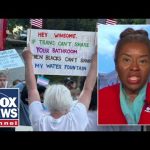In a recent discussion over crime rates in Washington, D.C., a surprising fact emerged: the city has gone 12 days without a murder. While this sounds like a cause for celebration, the conversation quickly moved to the political theater that surrounds crime and safety in urban areas, specifically how it plays into the larger narrative of political leaders like Donald Trump.
One participant pointed out that while 12 murder-free days may be a positive development, it does not eclipse earlier records. This individual suggested that the headlines may be more about distracting from the real issues at hand, particularly the economy and inflation, which many believe is a pressing concern for voters. The critics argue that Trump has been known to steer conversations away from economic woes, focusing instead on issues like crime to divert attention.
The debate heated up as one commentator pushed back against the notion that Trump was merely creating distractions. Instead, he highlighted the importance of safety, arguing that tackling crime is one of Trump’s several successes as president. According to him, simply juggling numerous responsibilities doesn’t detract from the effectiveness of policies aimed at fighting crime. However, others raised eyebrows at the idea of using crime rates in Washington as a barometer for success, emphasizing that safety is fundamental to economic recovery, especially in restaurant revenues that have reportedly dwindled.
When the topic of Chicago arose, the conversation took yet another turn. Chicago’s crime rates and governance were scrutinized as a case study for the effectiveness of local leadership. One participant noted that Donald Trump may have lost in Chicago by significant margins in multiple elections, which raised questions about the city’s leadership and their approaches to crime. Critics of the current administration pinpointed the need for accountability in how cities handle public safety and questioned the reluctance to adopt measures like calling in the National Guard for assistance.
In light of the intense emotions surrounding urban safety, some expressed their worries about the implications of meeting crime with military presence. Many feel uneasy about the idea of armed forces on city streets, fearing it could lead to an atmosphere of fear rather than safety. The necessity for a balance between law enforcement presence and community well-being became apparent, leading to discussions about the financial aspects of policing and community support.
As the dialogue wound down, participants echoed a sentiment that transcends political boundaries: cities across the nation, regardless of their political affiliations, need to address crime more effectively. They all agreed that the focus should shift to empowering local leaders and ensuring that communities feel safe and supported. In a time when public safety is paramount, collaboration among all parties is essential to forge a safer environment for everyone. Whether a matter of juggling many challenges or focusing on a singular crisis, the bottom line remains that the community’s welfare should always take precedence.




